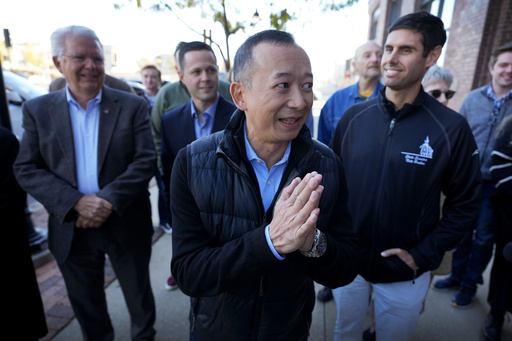
WASHINGTON — Iowa has a longstanding reputation as a crucial state in presidential elections, but as voters prepare to cast their ballots on November 5, the focus might shift toward contests lower on the ticket.
Voters in Iowa will engage in highly contested U.S. House races that could determine party control in the chamber, alongside competitive state legislative contests that may grant Iowa Republicans a solid supermajority. Additionally, voters will deliberate on statewide ballot measures concerning citizenship requirements for voting and changes to the gubernatorial line of succession.
The electoral battle for Iowa features Democratic Vice President Kamala Harris and former Republican President Donald Trump vying for the state’s six electoral votes. Historically, Iowa has experienced narrowly contested presidential elections, evidenced by slim margins during the votes for Al Gore and George W. Bush in 2000 and 2004, respectively. Barack Obama marked the last time a Democrat claimed victory in Iowa during the 2008 and 2012 elections.
Political sentiment in Iowa has shifted in recent years, seemingly distancing the state from Democratic leanings. Presently, the Republican Party holds all congressional seats in Iowa, dominates the governor’s office, occupies most statewide roles, and commands overwhelming majorities in the state Legislature. Trump secured victories in Iowa with substantial leads during both the 2016 and 2020 elections. Interestingly, neither of the presidential candidates has made a visit to Iowa since their nominations.
In the U.S. House races, two Republican incumbents face challenges in their reelection efforts. In Iowa’s 1st District, Rep. Mariannette Miller-Meeks is set for a rematch against Democrat Christina Bohannan, who narrowly lost to Miller-Meeks by seven points in the previous election cycle. In the 3rd District, Republican Rep. Zach Nunn aims for reelection against Democrat Lanon Baccam, who previously served as a USDA administrator. The Des Moines-area district was won by Trump by a razor-thin margin of just 0.4 percent, underscoring a competitive atmosphere as Democrats need to gain only a few seats to reclaim control of the U.S. House.
Meanwhile, Republicans maintain sizable advantages in both chambers of Iowa’s Legislature and require a few more state House seats to establish a supermajority while already holding the governorship.
Another focal point of the election will be two proposed constitutional amendments. The first amendment seeks to prohibit non-citizens from voting and allows 17-year-olds to participate in primary elections if they will turn 18 by the general election date. The second amendment aims to clarify the line of succession should the lieutenant governor ascend to the governor’s office.
As Iowa approaches the elections, it’s important to note that reliable projections will not be made until it is clear that trailing candidates cannot narrow the gap. Ongoing coverage of significant developments, such as candidates’ acknowledgments of defeat or declarations of victory, will occur to keep the public informed.
Looking ahead to the electoral events slated for November 5 in Iowa, here are some key details:
– **Election Day**: November 5.
– **Poll Closing Time**: 9 p.m. ET.
– **Presidential Electoral Votes**: 6 awarded to the statewide winner.
– **Key Races and Candidates**: President: Harris (D), Trump (R), along with Chase Oliver (Libertarian), Claudia De la Cruz (Party for Socialism and Liberation), Robert F. Kennedy Jr. (We The People), among others.
– **1st Congressional District**: Rep. Miller-Meeks (R) vs. Bohannan (D).
– **3rd Congressional District**: Rep. Nunn (R) vs. Baccam (D).
– **Ballot Measures**: Amendment 1 (pertaining to voter citizenship requirements and voting age modifications).
– **Other Contests**: Races within the U.S. House, state Senate, and state House, along with Amendment 2 (focused on gubernatorial succession).
In the previous presidential election cycle of 2020, Trump garnered 53% of the votes compared to Biden’s 45%, with the race officially called on November 4 at 12:21 p.m. ET. As of September 3, 2024, registered voters in Iowa total 2,223,492, reflecting a voter turnout of 74% during the 2020 elections.
Early voting statistics indicate that approximately 59% of total votes were cast before Election Day in 2020, while around 30% turned up prior to Election Day 2022. For the upcoming 2024 election, further insights on early voting can be tracked through local updates.
Lastly, the timeline for vote counting in previous elections demonstrates that initial results were reported on November 3, 2020, at 10:11 p.m. ET, with around 82% of the total votes accounted for by midnight ET.
The upcoming elections in Iowa present a compelling contest not just for presidential votes but also for local and congressional leadership, reflecting shifting dynamics in the state’s political landscape.
